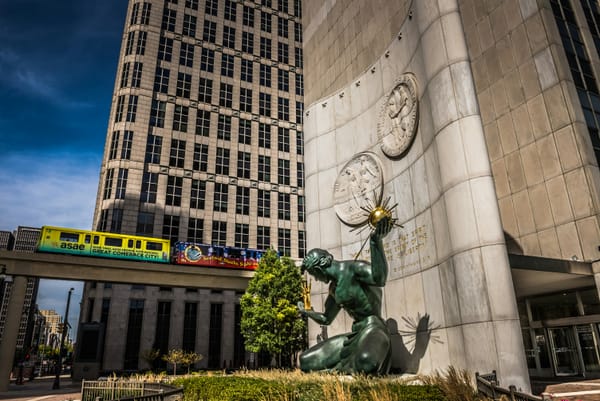Today, Gleaner’s Food Bank and Forgotten Harvest with the help of the PepsiCo Foundation, announced the launch of two new food delivery programs that will significant enhance the firepower in the fight against food insecurity in Southeastern Michigan.
The first program, “My Neighborhood Mobile Grocery,” was created through the collaboration of Gleaners Foodbank and PepsiCo. It’s a traveling pantry that will enable the nearly one third of Supplemental Nutritional Assistance Program (SNAP) Clients in southwest Detroit to maximize their purchasing power and select nutritious items based on dietary needs and food preferences, while extending a typical family’s food budget by offering $70 worth of food for every $50 they spend.
The second program was an effort between the food rescue operation Forgotten Harvest and PepsiCo, which explored a new model to improve Forgotten Harvest’s logistical efficiencies, such as fleet routing and warehouse management.
The result is a more decentralized supply chain model that should ensure the availability of fresh, healthy food, delivered at a lower cost to the most critical need areas in Detroit. The program could produce as much as a 25% increase Forgotten Harvest’s current food distribution numbers.
The collaboration began in the Spring of 2015, when PepsiCo sent 8 members of their PepsiCorps team — a skill-based volunteer program in which select PepsiCo associates from around the world are deploy to a community to leverage their business skills and expertise to address societal challenges — to help Forgotten Harvest and Gleaners develop the improve their strategic efforts.
In addition to strategic development, PepsiCo also donated a 53 foot semitrailer to Forgotten Harvest and a 24 Foot mobile food pantry to Gleaners.
At first, the two non-profits submitted competing proposals to enter the program. That was until Forgotten Harvest CEO Kirk Mayes and Gleaner’s President Gerry Brisson elected to join forces, convincing PepsiCo to offer assistance to both organizations.
“This is why this is a special day for us,” said Mayes during his remarks Monday, “For some reason it’s been hard for two really important organizations, over the course of all these years, to figure out where we can come together and make sense on our business models to serve the community. And I’m proud to say that with the partnership we have today, the first question is what can we do first to improve our community, and improve our ability to reduce food insecurity in Wayne Oakland and Macomb counties.”
Both Brisson and Mayes expressed their enthusiasm and gratitude to PepsiCo, with Mayes saying that he “Appreciated working with Pepsi. I’ve appreciated working with the team that came together. Not only did that team help us to fill in some of the intellectual gaps that we didn’t have on our staff, but they really came and adopted the passion that we share for serving in our community. In a way that we still feel the residue of love in our facility everyday from the PepsiCo team.”
Indra K. Nooyi, the Chairman and Chief Executive Officer of PepsiCo, applauded the collaborative effort of the two organizations.
“I want to say a particular thank you to Gerry and to Kirk, for your very important work in Detroit to help those in need. If in every city and every country great organizations could come together and work on a common cause, can you imagine how we could change the dialogue around the world? Thank you for setting the example.”
Gleaners has been pursuing the mission of “feeding hungry people and nourishing our communities” for nearly 40 years. Since then they’ve provided the equivalent of nearly 77,00 meals per day to folks who otherwise cannot after the food they need, by partnering with more than 500 partner soup kitchens, food pantries, shelters, and other agencies throughout Eastern Michigan.
Forgotten Harvest, formed in 1990, gifts two problems: hunger and waste. Last year they “rescued” more than 41 million pounds of food by collecting surplus prepared and perishable food from over 800 locations, including grocery stores, fruit and vegetable markets, restaurants, and other Health-Department approved sources. The food is then delivered free-of-charge to over 290 emergency food providers in the in the metro Detroit area.







